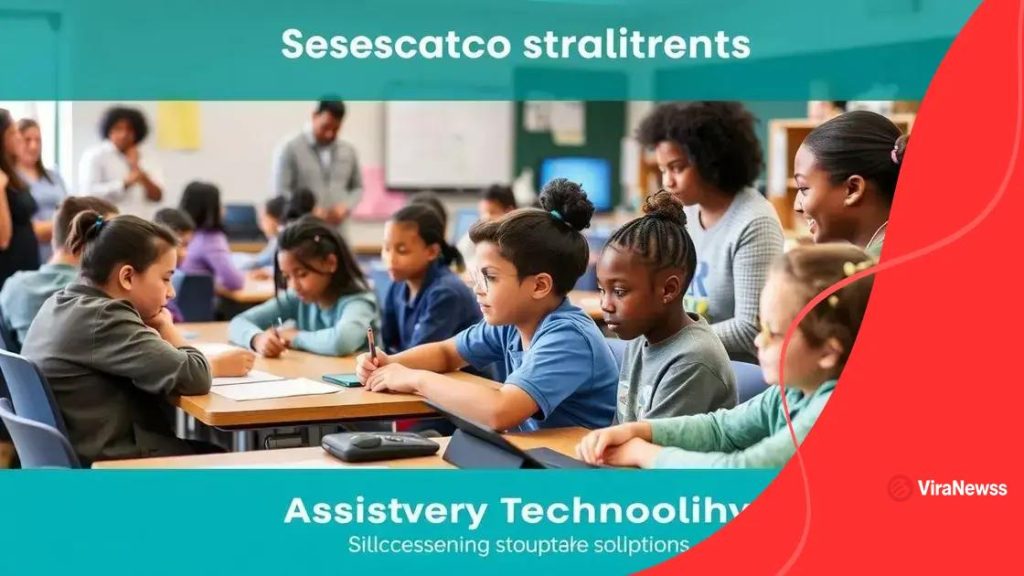Support services for students with disabilities expanded

Anúncios
Support services for students with disabilities are essential programs that provide tailored support, ensuring these students receive the resources needed for academic success and emotional well-being in an inclusive educational environment.
Support services for students with disabilities expanded significantly in recent years, aiming to create a more inclusive learning environment. Have you ever wondered how these services can reshape the educational experience for many students? Let’s dive into what this means for learners and educators alike.
Anúncios
Understanding the need for support services
Many students with disabilities face unique challenges in their academic journey, making it essential to provide adequate support services. Understanding the need for support services not only fosters a more inclusive environment but also enhances the overall educational experience.
Why Support Services Matter
Support services are crucial because they help level the playing field for students with disabilities. These services can include tutoring, counseling, and accommodations tailored to individual needs. When students receive the appropriate assistance, they are more likely to succeed in their studies.
- Enhances student engagement.
- Promotes academic success.
- Fosters a sense of belonging in the school community.
Moreover, schools that prioritize support services show a commitment to equity and access. This commitment can significantly impact students’ self-esteem and motivation. When students see that their needs are acknowledged and addressed, they become more invested in their education.
Anúncios
Types of Support Services Available
Various types of support services cater to the diverse needs of students with disabilities. From individualized education programs (IEPs) to mental health resources, options are plentiful. Schools often collaborate with parents and professionals to create tailored plans that best support each student.
- One-on-one tutoring sessions.
- Accessible learning materials.
- Assistive technology resources.
This collaboration not only ensures that students receive what they need but also fosters a supportive network around them. It’s essential for educators and families to communicate openly and work together toward common goals, making support services a community effort.
Key features of expanded support services
As education evolves, the key features of expanded support services play a crucial role in aiding students with disabilities. These features are designed to ensure that all students have access to the resources they need to thrive.
Personalized Learning Plans
One essential feature is the development of personalized learning plans. These plans are tailored to meet the individual needs of each student, taking into account their strengths and challenges. Personalization helps educators provide targeted support and track progress effectively.
- Custom goals and objectives.
- Regular assessments and adjustments.
- Collaboration among teachers, parents, and specialists.
By focusing on the individual, schools can create an environment where every student feels valued and supported.
Access to Assistive Technology
Another vital component is access to assistive technology. This technology can empower students with disabilities by enhancing their learning experiences. Tools such as speech-to-text programs, screen readers, and communication devices can make a significant difference in achieving academic goals.
- Improved communication skills.
- Increased independence.
- Enhanced engagement and participation in class activities.
With technology integrated into their education, students can better express themselves and engage in learning.
Comprehensive Mental Health Support
Additionally, comprehensive mental health support is another key feature of expanded services. Mental health is just as important as academic success. Schools are now focusing on providing resources for emotional well-being, which can help students cope with stress and anxiety.
This approach creates a supportive atmosphere where students can thrive academically and emotionally. When students feel secure and understood, they are more likely to succeed.
How these services improve student success

How these services improve student success is a critical topic to explore. When schools enhance support services for students with disabilities, they create a pathway for greater achievement and fulfillment. Each support service plays a unique role in students’ lives.
Individualized Support
One major factor is individualized support. When services are tailored to meet the specific needs of each student, the likelihood of success significantly increases. Teachers and support staff work closely with students to identify strengths and challenges, paving the way for targeted interventions.
- Regular feedback and adjustments to learning plans.
- Encouragement to set and meet personal goals.
- Access to additional resources as needed.
This individualized approach not only promotes academic growth but also boosts confidence, enabling students to feel more capable and engaged in their education.
Building Social Skills
Another essential aspect is building social skills. Expanded support services often focus on fostering connections among students. Group activities, workshops, and peer mentoring can provide a safe space for students to develop friendships and improve their social interactions.
- Improved communication skills.
- Increased collaboration in group projects.
- Greater participation in school events.
As students build positive relationships, they tend to experience enhanced emotional well-being and a sense of belonging, both of which contribute to academic success.
Academic Achievement
Furthermore, these services often lead to improved academic achievement. With tailored support, students are better equipped to grasp complex concepts and participate actively in class discussions. This involvement not only reinforces learning but also prepares students for future challenges academically and in life.
Overall, by ensuring that students with disabilities receive the necessary support, schools can significantly enhance their chances of success.
Real-life examples of effective support services
Real-life examples of effective support services highlight how schools can successfully implement programs to assist students with disabilities. These examples showcase the positive impact these services can have on student learning and well-being.
The Buddy Program
One effective initiative is the Buddy Program, where students with disabilities are paired with peer mentors. This program encourages social interaction and friendship. Mentors receive training on how to provide support, helping to bridge the gap between students.
- Improves social skills among participants.
- Fosters a sense of belonging in school.
- Encourages empathy and understanding among all students.
This real-life example shows how structured support can enhance relationships and make school a more inclusive environment.
Technology Integration
Another inspiring case is the use of technology in classrooms. Schools that incorporate assistive technology, such as speech recognition software or interactive learning apps, significantly benefit students. These tools allow students with disabilities to engage more fully in lessons and complete assignments more effectively.
- Increases independence in learning.
- Encourages participation in classroom discussions.
- Facilitates personalized learning experiences.
By integrating technology into their educational practices, teachers can better meet diverse learning needs while empowering students.
Focus on Mental Health
Additionally, many schools have developed comprehensive mental health programs aimed at supporting students with disabilities. These programs may include counseling services, stress management workshops, and programs promoting mindfulness practice. By addressing emotional well-being, schools create a foundation for academic success.
Such approaches show that when emotional and educational needs are met, students are more likely to thrive both in and out of the classroom.
Future directions for disability support in education
In considering the future directions for disability support in education, it’s essential to recognize the ongoing evolution of educational practices. Schools are increasingly adopting innovative strategies to better accommodate students with disabilities, ensuring they receive the support they need.
Inclusive Curriculum Design
One significant trend is the development of inclusive curriculum designs. Educators are focusing on creating materials that cater to diverse learning styles. This approach helps mitigate barriers that students with disabilities often face, allowing for meaningful engagement.
- Universal Design for Learning (UDL) principles.
- Variety of assessment methods to suit the individual.
- Incorporation of real-world applications in lessons.
By implementing these strategies, schools can create an environment where all students feel empowered to learn.
Increased Collaboration with Families
Another promising direction is the emphasis on increasing collaboration between schools and families. Open lines of communication help ensure that parents are involved in the decision-making processes regarding their child’s education. When families and educators work together, they can provide consistent support both at school and at home.
- Regular meetings to share progress and strategies.
- Workshops for parents on available resources.
- Involvement in IEP meetings to give input on goals.
This partnership can enhance the educational experience and lead to better outcomes for students.
Focus on Mental Health and Wellness
Additionally, there is a growing recognition of the importance of mental health in education. Schools are beginning to prioritize social-emotional learning (SEL) alongside academic achievement. Programs that focus on developing resilience and coping strategies are being introduced.
With this focus, students not only learn to navigate their academic challenges but also their emotional ones. Addressing both aspects is key to supporting the whole child.
FAQ – Frequently Asked Questions about Support Services for Students with Disabilities
What are support services for students with disabilities?
Support services include various resources and programs designed to help students with disabilities succeed academically and socially in school.
How do personalized learning plans work?
Personalized learning plans are tailored strategies that address each student’s unique needs, helping them set and achieve academic goals.
Why is family collaboration important in education?
Family collaboration ensures open communication between parents and educators, allowing for better support and understanding of the student’s needs.
What role does mental health play in education?
Mental health is crucial for student success; programs focus on social-emotional learning to help students manage stress and build resilience.





